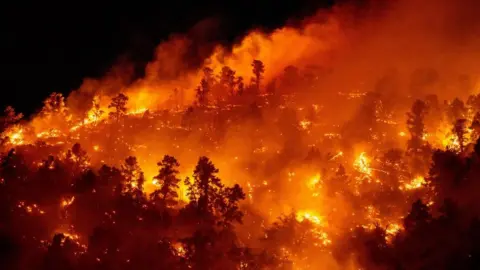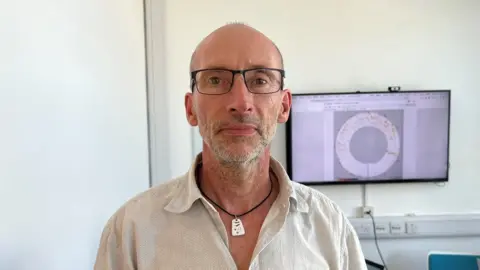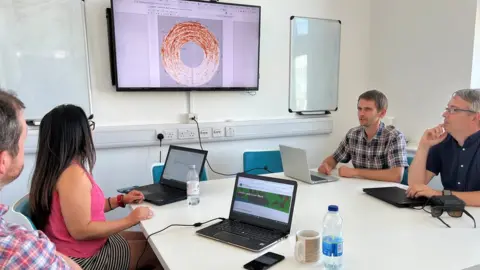Wildfires: Swansea University developing forecast system
 Reuters
ReutersA system to predict wildfires is being developed at a UK university.
Swansea University is working on a model like those used in Canada and Australia in the hope it will help track the likelihood and risk fires pose as the climate gets warmer.
At the moment the Met Office uses data from its fire severity index. That offers information on how bad a blaze could get in certain conditions.
Wildfires have been historically less extreme in the UK than elsewhere.
But they could become more common with climate change.
This new system, developed by the university's Centre for Wildfire Research, will be a UK first.
The centre's director, Prof Stefan Doerr, said his team were interested in how climate change was affecting fire occurrence and the harm fires could cause people, the environment and infrastructure.
They were working on a UK fire danger rating system to predict what risk fires will pose if they break out.
"So it will tell us, in this particular type of vegetation, under these particular weather conditions, the flames may be very high, so too high for example, for people on foot," Prof Doerr said.

That could help firefighters planning how to tackle a blaze.
"The system should also tell us whether there are any assets at risk, are there houses nearby, do we need to evacuate people," Prof Doerr said.
He hoped the system would provide effective wildfire warnings that could help with fires such as those seen in London in July.
"Fires in the UK are becoming more and more problematic, and the behaviour of the fires as well, how long the flames are, for example, or how rapidly they spread over the landscape," said Prof Doerr.
"That is changing with climate change.
"The project's overall aim is to ultimately provide the fire service, other emergency services [and] also the public with information of how dangerous a fire would be if it occurs in a particular location."
He said the Met Office system gave good basic information but did not go into enough depth.
The Met Office, he said, was now working with the Centre for Wildfire Research.
"It may be that the Met Office actually will use some of this, it may also be that we get future funding and build our own in partnership with the Met Office," he said.
Mid and West Wales Fire Service welcomed the research.
The fie service's Richard Vaughan-Williams said climate change would have consequences for firefighters.

"We're looking at putting different procedures, different equipment in place, to look at how that could affect us in the next couple of decades," he said.
Most wildfires, he said, were started by people.
This could be as a result of arson or carelessness, such as a fire caused by a disposable barbecue.
"Accidental causes are quite few and far between, things like natural events like lightning or maybe a spark from a combine harvester on a field."

- A CAREER CHANGE WITH A DIFFERENCE: Police new recruits adapt to life on the beat
- THE CRASH DETECTIVES: Inside the cordon with Gwent Police's forensic collision investigators

